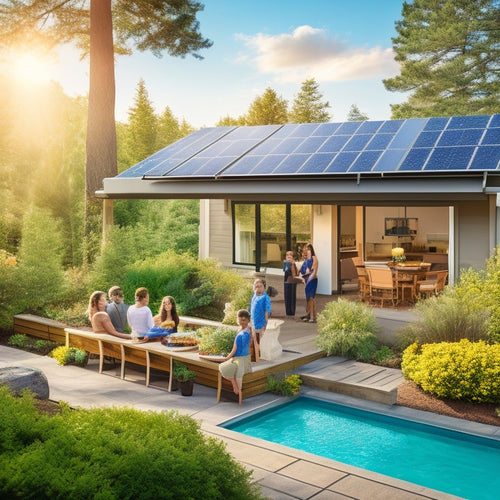
Why Choose Off-Grid Water Pumping for Homes
Share
By choosing off-grid water pumping for your home, you'll gain independence from municipal water supplies, ensuring access to water during emergencies and enhancing control over water quality. You'll also decrease your reliance on public sources, conserve groundwater, and harvest rainwater, a free resource that minimizes stormwater runoff. With off-grid systems, you'll have more control over your water supply, reducing the risk of municipal shortages and encouraging conservation. As you investigate the benefits of off-grid water pumping, you'll uncover how it can lead to increased water storage capacity, lower operating and maintenance costs, and a reduced carbon footprint, ultimately allowing you to take the next step towards water self-sufficiency.
Overview
- Off-grid water pumping provides independence from municipal water supplies, ensuring a reliable water source during emergencies and natural disasters.
- It allows for enhanced control over water quality, reducing the risk of contaminants and additives, and promoting groundwater conservation.
- Off-grid systems reduce reliance on municipal water supplies, decreasing demand on aquifers and conserving a free resource through rainwater harvesting.
- They offer long-term financial benefits, including lower operating and maintenance costs, and increased property value with sustainable systems.
- Off-grid water pumping promotes environmental stewardship, minimizing wastewater discharge, reducing carbon footprint, and supporting sustainable water management practices.
Benefits of Off-Grid Water Systems
Off-grid water systems offer several benefits, particularly for homeowners who want to reduce their reliance on municipal water supplies.
You'll enjoy independence from public water sources and lower your water bills. By harvesting rainwater, you'll conserve this free resource and reduce stormwater runoff. Groundwater conservation is another advantage, as you'll decrease your demand on aquifers.
Additionally, off-grid systems provide a reliable supply during emergencies or natural disasters when municipal water may be unavailable. With solar-powered pumps, you can guarantee a reliable water supply and reduce your carbon footprint.
You'll also have more control over the quality of your water, assuring it's free from contaminants and additives. Overall, off-grid water systems offer a sustainable, self-sufficient solution for homeowners seeking freedom from municipal water dependence.
Solar Power for Water Pumps
As you move towards self-sufficiency with your off-grid water system, utilizing solar power for your water pumps becomes an essential component. This renewable energy source provides a reliable and eco-friendly way to pump water, reducing your reliance on fossil fuels and minimizing your carbon footprint.
When selecting a solar-powered water pump, consider the following factors:
| Factor | Consideration |
|---|---|
| Solar Panel Efficiency | Higher efficiency panels maximize energy output |
| Pump Size Selection | Correct pump size guarantees ideal water flow and pressure |
| Pump Type | Choose a pump designed for solar power, such as a DC submersible pump |
| System Monitoring | Monitor your system's performance to guarantee ideal operation |
Reducing Reliance on Mains Water
You're likely considering off-grid water pumping to reduce your reliance on mains water, and achieving water independence is now within reach.
By exploring mains supply alternatives, you can markedly decrease your dependence on municipal water sources. This approach not only enhances your self-sufficiency but also provides a reliable backup during water shortages or emergencies.
Additionally, renewable energy solutions like solar power systems can be integrated with off-grid water pumping to further reduce your carbon footprint and energy bills.
Water Independence Now
Beyond the convenience of municipal water supply lies a domain of freedom, where homeowners can break free from the shackles of reliance on mains water. You can achieve water independence by employing alternative sources, such as rainwater harvesting. This sustainable approach collects and stores rainwater for non-potable uses, like flushing toilets and washing machines.
Moreover, off-grid solar water pumping solutions improve irrigation and water supply, reducing fossil fuel reliance. Additionally, decentralized energy distribution tailors energy supply to community needs, making it an ideal solution for rural areas.
You'll reduce your municipal water consumption and lower your water bills. In addition, you can implement sustainable irrigation systems that make use of harvested rainwater for your garden and landscaping needs. By doing so, you'll not only reduce your reliance on mains water but also contribute to a more environmentally friendly lifestyle.
Mains Supply Alternatives
This shift towards water independence necessitates exploring mains supply alternatives that can considerably reduce your reliance on municipal water.
By leveraging alternative sources, you'll gain more control over your water supply and mitigate the risks associated with municipal water shortages.
Rainwater harvesting is a viable option, where rooftop collection systems channel rainwater into storage tanks for non-potable uses like flushing toilets and washing machines.
Groundwater extraction is another alternative, where wells or boreholes tap into underground aquifers, providing a reliable source of potable water.
Increased Water Storage Capacity
With respect to off-grid water pumping systems, having adequate water storage capacity is essential in ensuring a reliable supply of water for your home.
You need a system that can store enough water to meet your daily needs, even during periods of low rainfall or pump failure.
Rainwater harvesting is an effective way to collect and store rainwater for later use, reducing your reliance on municipal supplies.
By investing in storage solutions such as tanks and cisterns, you can increase your water storage capacity, providing a cushion against water scarcity.
This means you'll have a steady supply of water for your household, even when the grid goes down.
Lower Operating and Maintenance
One of the most significant advantages of off-grid water pumping systems is their potential to lower operating and maintenance costs.
You'll appreciate the reduced expenses that come with these efficient systems, which require less energy to operate. This is particularly true when you opt for sustainable solutions like solar-powered pumps, which utilize free energy from the sun.
As a result, you'll enjoy lower electricity bills and a reduced carbon footprint. Additionally, off-grid systems tend to have fewer moving parts, which means less wear and tear, and subsequently, lower maintenance costs over time.
Environmental Impact of Off-Grid
You'll find that off-grid water pumping systems greatly reduce your carbon footprint by minimizing reliance on fossil fuels and lowering greenhouse gas emissions.
By utilizing renewable energy sources, you'll conserve natural resources and decrease your overall environmental impact.
Additionally, off-grid systems generate minimal waste, making them an attractive option for environmentally conscious homeowners.
Reduced Carbon Footprint
The environmental impact of off-grid water pumping systems is markedly reduced compared to traditional grid-tied systems.
By choosing off-grid, you're embracing sustainable practices that minimize your carbon footprint. You'll no longer rely on non-renewable energy sources, reducing greenhouse gas emissions and air pollution.
Off-grid systems utilize eco-friendly technologies, such as solar, wind, or hydro power, to pump water. This shift away from fossil fuels decreases your reliance on the grid, making you less susceptible to power outages and rate hikes.
As you change to off-grid, you'll enjoy a cleaner, more independent lifestyle, aligning with your values of freedom and environmental stewardship.
Conservation of Resources
By utilizing natural energy sources, off-grid water pumping systems reduce your reliance on the grid, and in doing so, they also help conserve resources.
This approach enables you to collect rainwater and greywater, which would otherwise go to waste. Rainwater harvesting systems collect and store rainwater for non-potable uses, such as flushing toilets and washing machines.
Greywater recycling, on the other hand, reuses water from sinks, showers, and washing machines for irrigation and flushing toilets.
Minimal Waste Generation
During the operation of an off-grid water pumping system, one of the significant environmental benefits is the minimal waste generation that occurs.
You'll produce minimal wastewater, reducing your ecological footprint. By utilizing rainwater harvesting and greywater recycling, you'll minimize the amount of wastewater discharged into the environment.
This approach guarantees that you're not contributing to water pollution, and you're reusing precious resources. As a result, you'll reduce your reliance on municipal water supplies, decreasing the energy required to treat and transport water.
With an off-grid water pumping system, you'll enjoy the freedom to manage your water resources sustainably, minimizing waste and protecting the environment.
Frequently Asked Questions
Can I Use Off-Grid Water Pumps With Existing Plumbing Systems?
You can integrate off-grid water pumps with your existing plumbing system, guaranteeing system compatibility, as long as you've identified a suitable water source; just confirm the pump's pressure and flow rate match your home's plumbing requirements.
Are Off-Grid Water Pumps Suitable for Areas With Low Sunlight?
You'll find off-grid water pumps suitable for areas with low sunlight if you opt for alternative energy sources, such as battery banks or wind-powered systems, instead of relying solely on solar alternatives.
How Long Do Off-Grid Water Pumps Typically Last?
You're about to tap into a wealth of independence! Off-grid water pumps typically last 10-15 years, but with regular maintenance, like cleaning and lubricating, you can extend their lifespan, ensuring a steady flow of freedom and self-sufficiency.
Can I Install an Off-Grid Water Pump Myself?
You can attempt a DIY installation, but it's essential to evaluate your technical skills and the pump's complexity. Improper setup can lead to premature failure, making regular pump maintenance a challenge, so it's often recommended to hire a professional for a hassle-free experience.
Are Off-Grid Water Pumps More Expensive Than Traditional Pumps?
You'll find that off-grid water pumps typically cost more upfront, but when you factor in installation expenses, they can be more cost-effective in the long run, especially considering the money you'll save on energy bills.
Ready to Buy
You may think that off-grid water pumping is too complicated or expensive, but the benefits far outweigh the initial investment. By choosing an off-grid water system, you'll reduce your reliance on mains water, increase your water storage capacity, and lower your operating and maintenance costs. Plus, you'll be doing your part for the environment. So, why not take the leap and join the off-grid revolution? With solar power for water pumps, you can rest assured that your water needs are met, no matter what.
Related Posts
-

Top Portable Refrigerators for Camping Adventures
When you're camping, having a reliable portable refrigerator can make all the difference for keeping your food fresh ...
-

Top-Rated Home Solar Power Kits for Achieving Energy Independence
Top-rated home solar power kits enable you to achieve energy independence by greatly cutting your energy costs. You c...
-

Designing a Green Roof for Maximum Energy Efficiency
Designing a green roof for maximum energy efficiency involves several key strategies. Start by selecting native, drou...


